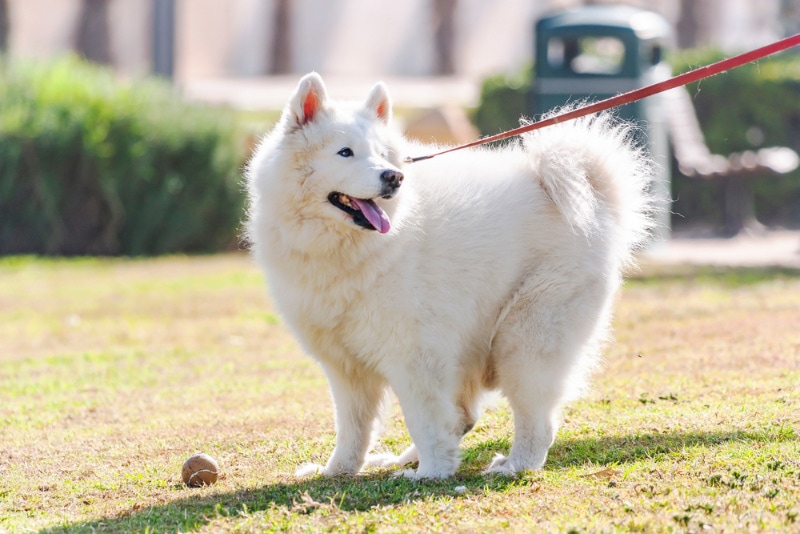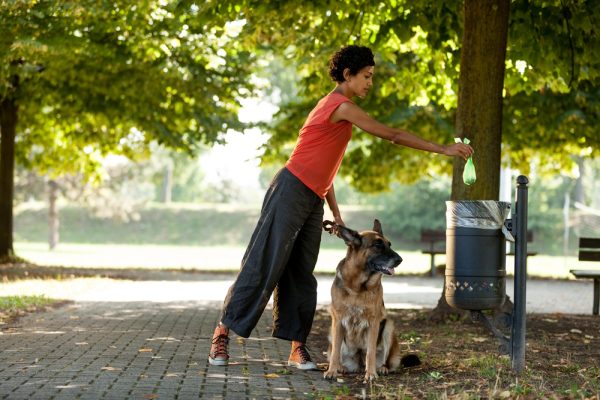In this article
View 3 More +If you have owned a puppy, you know how fast they can grow! In the beginning, the puppy stage may seem like it will never end, and when it does, you wish it never did! It’s also easy to forget how long the period lasts, so if you are considering adopting a new puppy or are becoming a first-time owner, you may be wondering how long a dog stays a puppy.
This adorable period of puppyhood differs between dogs depending on their breed and size, but puppies are typically considered adults once they’re a year old.

How Long Is a Dog Considered a Puppy?
To give a nice, round number puppies are generally considered adults when they reach 1 year of age. However, becoming an adult is more about growth and maturity than it is age. This will depend on the breed and size of the dog.

Factors That Determine When a Puppy Becomes an Adult
A few factors can determine how long a dog is considered a puppy, which can differ depending on the breed’s physical, emotional, and sexual maturity.
Physical Maturity
Physically, dogs are generally fully grown by the age of one, but they may still engage in puppy-like behaviors. Once they have reached physical maturity, their diet and exercise will become that of an adult dog.
Small and medium dog breeds will grow relatively fast and typically stop growing at 6–8 months of age. In fact, they finish growing at about half the age of larger breed dogs. Medium breeds will take slightly longer, often reaching full size at around 12 months old. Large breed dogs take longer to reach full size because they have bigger bones that need more time to grow.
They will typically reach full size at around 12–18 months old, with giant breeds taking up to 24 months to reach their full size.
Emotional Maturity
Your dog will stop acting like a puppy or an adolescent and fully transition into the role of an adult dog when they have acquired emotional maturity. Emotionally mature adults typically have a calmer and more composed temperament, are less easily distracted, and are better at listening and obeying.
While the exact timing varies, most dogs mature emotionally by the time they turn 2 years old.
Sexual Maturity
Most dogs reach sexual maturity by 6–9 months when they are still physically and emotionally developing. Larger breeds will reach sexual maturity later, usually around the 12–18 month mark. Your pup can reproduce at this time because their sex organs have finished developing.
That is why having your dog spayed or neutered by 6 months old is often recommended to prevent unwanted pregnancies.

Should a Growing Puppy Be Fed Differently?
Puppies have different dietary needs than adult dogs because they are still developing. Puppies require a diet formulated to meet their dietary needs; the nutritional requirements will differ between small and large breed puppies.
Protein and Fat
Puppies need a high amount of protein immediately after weaning, but their protein requirements will decrease as they grow. They typically require 22%–32% protein on a dry matter basis. The fat content for puppies should be between 10%–25% on a dry matter basis. Fat is a source of energy and essential fatty acids, but too much can lead to obesity.
AAFCO-Approved Brands
Food formulated for puppies is the better choice, but you will also find brands formulated for all life stages. If you choose one of these brands, just know that it may be too low in some nutrients for your puppy or too high in some nutrients for your adult dog.
Your growing puppy will receive all the nourishment they require from foods that adhere to the nutritional standards established by the Association of American Feed Control Officials (AAFCO).
Most importantly, always feed your pup according to the directions on the food package to prevent them from gaining weight, and ask a veterinarian for guidance regarding your puppy’s diet and nutritional needs.
If you need to speak with a vet but can't get to one, head over to PangoVet. It's our online service where you can talk to a vet online and get the personalized advice you need for your pet — all at an affordable price!

How Should I Exercise a Growing Puppy Safely?
Although pups require exercise to keep healthy and prevent boredom, excessive exercise is not good for them. Too much intense exercise can harm your puppy’s growing joints and bones and lead to issues like arthritis and hip dysplasia. Jogging, agility, and other high-impact exercise with a dog under the age of 14–18 months is not recommended until the growth plates have fully fused, especially in large-breed dogs.
Until your dog is fully developed, walking, swimming, or low-impact playing is best. A fun way to keep your pup mentally and physically active is obedience and other types of training. Just remember that they also require plenty of sleep, so give them the space to rest when they are tired. Your puppy can exercise more as they grow older.

More Tips for Caring for a Puppy
One of life’s greatest joys is getting a new puppy, but it comes with responsibility and planning. To take the best possible care of your new puppy, here is a list of essential items:
- Food and water bowls
- Blankets and dog bed
- A harness/collar and leash
- Chew toys
- A crate
- A screen or gate
As your puppy grows, some of these items, like harnesses and beds, will need to grow with them and be replaced as needed.
- Puppies are naturally curious as they explore their surroundings, so you should consider puppy-proofing your house before bringing your puppy home. Puppy gates can stop your pup from wandering to places they’re not meant to go and will keep them from falling down the stairs.
- You will also need a couple of chew toys for your teething pup, especially if you want to save your shoes and other items in your home.
- Research suitable pet insurance to cover unforeseen expenses and to ensure your pup can get the help they need in an emergency. Pet insurance is typically cheaper for puppies than adults.
- Your puppy will need to be vaccinated. While you are at the veterinarian’s office, you can talk about microchipping and flea and tick prevention.
- Talk to a veterinarian about when is the best time to have your puppy spayed or neutered.
- You should start socializing and training your pup as soon as possible but only once they are fully vaccinated. Obedience training can start as soon as you bring your puppy home.

Conclusion
The puppyhood phase of your dog may be bittersweet as you watch them grow and learn, but the time goes by so fast! A dog is considered a puppy up until about a year, which is only a small portion of their timeline, so embrace it!
Your dog’s puppy phase may vary depending on their breed, but taking care of their changing nutritional and exercise requirements can keep them in top health and pave the way for a caring relationship that will benefit you both in the long run.
- Related read: 5-Month-Old Puppy
Featured Image Credit By: Tanya Dvoretskaya, Shutterstock





















